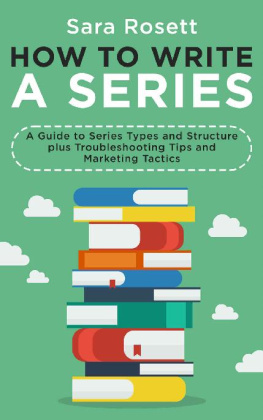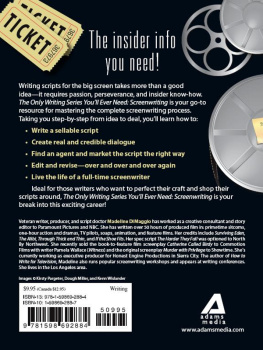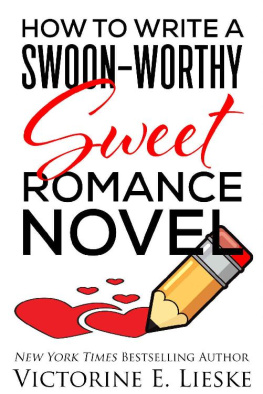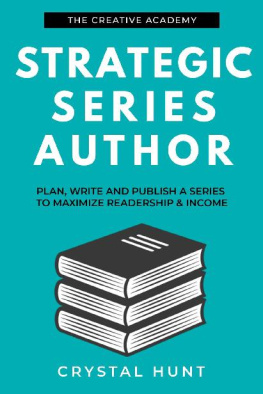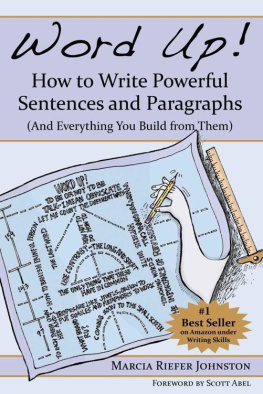ROSETT - HOW TO WRITE A SERIES
Here you can read online ROSETT - HOW TO WRITE A SERIES full text of the book (entire story) in english for free. Download pdf and epub, get meaning, cover and reviews about this ebook. year: 2020, genre: Computer. Description of the work, (preface) as well as reviews are available. Best literature library LitArk.com created for fans of good reading and offers a wide selection of genres:
Romance novel
Science fiction
Adventure
Detective
Science
History
Home and family
Prose
Art
Politics
Computer
Non-fiction
Religion
Business
Children
Humor
Choose a favorite category and find really read worthwhile books. Enjoy immersion in the world of imagination, feel the emotions of the characters or learn something new for yourself, make an fascinating discovery.
HOW TO WRITE A SERIES: summary, description and annotation
We offer to read an annotation, description, summary or preface (depends on what the author of the book "HOW TO WRITE A SERIES" wrote himself). If you haven't found the necessary information about the book — write in the comments, we will try to find it.
HOW TO WRITE A SERIES — read online for free the complete book (whole text) full work
Below is the text of the book, divided by pages. System saving the place of the last page read, allows you to conveniently read the book "HOW TO WRITE A SERIES" online for free, without having to search again every time where you left off. Put a bookmark, and you can go to the page where you finished reading at any time.
Font size:
Interval:
Bookmark:


HOW TO WRITE A SERIES
A Guide to Series Types and Structure plus Troubleshooting Tips and Marketing Tactics
Book Two in the Genre Fiction How To series
Published by McGuffin Ink
Copyright 2020 by Sara Rosett
Cover Design: Inspired Cover Design
All rights are reserved. Without limiting the rights under copyright reserved above, no part of this work may be used, stored, transmitted, or reproduced in any manner or form whatsoever without express written permission from the author and publisher.

To my IRL writer friends,
Jami and Danielle, who have been there with me as I completed two series and began another.
Heres to many more for all of us!
Learn how to make a series work for you: increase reader engagement and take advantage of the built-in marketing potential a series gives you.
Are you unsure which series structure is best for you? Or are you several books into a series, but youre stuck? Do you want to expand your literary universe but arent sure how to do it? Perhaps you have a series languishing in your backlist, and you need ideas on how to market it.
Get the knowledge you need to make smart decisions about your series with How to Write a Series.
- The three basic types of series
- The benefits and drawbacks of writing each type of series
- Tips for extending your series beyond your original plan
- Ideas for creating spinoffs and expanding your literary universe
- How to know when its time to end a series
- How to save time writing your series and how to keep track of details
- How to deal with the problems that result from being locked into a story world
- How to refresh your interest in a series if youve grown bored
- Creative ways to market your series
Ive been writing for fifteen years as both a hybrid and independent author. Ive published over twenty-five fiction books in four different series. Everything Ive learned about writing a series has been through trial and error.
I hope my lessons-learned will give you a shortcut when it comes to writing your series, plus tips for troubleshooting problems, and ideas for promoting your series.
Write what you know.
often attributed to Mark Twain
Write a series is a piece of advice that new writers hear over and over again. Its an often-quoted mantra like read in your genre and write what you know. Veteran authors point to these basic premises as keys to success in publishing.
Read in your genre and write what you know are pretty self-explanatory, and at first glance the advice to write a series might seem to be self-explanatory (write books linked through a protagonist or another element like a setting).
But I discovered writing a series is a deep and complex topic, yet theres little guidance for authors on how to put individual books together in a way thats satisfying for readers. Most writing advice focuses on how to produce a single book. Few writing craft resources discuss the nuts and bolts of series writing.
When I sat down to write my first book I felt pretty confident about a few things. I was a cozy reader. Know your genre: check! My protagonist was a military spouse. I was a military spouse. Write what you know: check! My confidence faltered a bit at the advice to write a series.
I had no idea what I was doing when it came to writing a series, and I only found a few blog posts on the topic. But I knew the book I was writing would be Book One of a series because it was a cozy mystery. A stand-alone cozy is rare, practically non-existent!
I decided to focus on the task at hand and get Book One written. I worked my way through a multitude of drafts and revisions until I had a book. The concept of that book as part of a series remained a shadowy idea, barely on my radar.
When I finished editing and revising my first mystery I had rough concepts for the next few books. I had ideas for the mysteries in the next few books, but the only plan I had for the series element was that the main character, who was a military spouse, would move every few books, which would help the series avoid Cabot Cove syndrome.
If youre familiar with Murder, She Wrote, you know that the small town where Jessica Fletcher lived, Cabot Cove, was plagued by an unusually high murder rate, a situation that strains believability after a few murderous incidents. I figured with my protagonists built-in ability to move around, Id solved one problem with writing a series.
I didnt think about other elements of the series, or how the protagonist and her situation would impact the books over the long term. I didnt consider the limitations Id face with a mom of a baby as a sleuth. She had to be responsible and find child care every time she went sleuthing, which became one of the most annoying parts of plotting each book. I didnt think about how giving the series a reset by moving it to a new location every few books could cause problems if readers were following the journeys of supporting characters. (Theyd have to move too!)
And speaking of supporting characters, I also didnt think twice about the ages of the kids in the seriesabout how fast or slow theyd age or about how their growing up would impact the series. The antics and activities of the kids provided some of the humor and also gave readers whose kids were grown the ability to indulge in nostalgia. As they read about Ellies kids, they enjoyed remembering when their kids were young. If the kids in the series grew up, would readers still be interested in Ellie without her band of cute Pre-K kids tagging along?
The issues I encountered while writing the Ellie books lead me to formulate a completely different type of character for my second series and to have a more thought-out plan for the On the Run series. That plan turned out to be a little too strict and had to be modified. I went from one end of the spectrum (very little planning) to the other (a plan that was too limiting). I learned how to expand a series beyond my original vision of a trilogy.
With my next two series, I feel Ive hit a happy medium of creating a flexible plan that I can modify if I need to. Ive learned how to think ahead and envision issues that could be problems. Ive learned how to keep track of details. Ive created a spin-off series and created a literary universe that can sustain several different series. Ive also had to decide it was time to end a series.
Everything Ive learned about writing a series has been through trial and error. I hope my lessons-learned will give you a shortcut when it comes to writing your series, help you avoid writing yourself into a corner, and spark ideas for your series.
Ive tried to include a variety of examples throughout the book from many different genres. To make the examples as accessible as possible, Ive tried to stick with series that are well-known.
Font size:
Interval:
Bookmark:
Similar books «HOW TO WRITE A SERIES»
Look at similar books to HOW TO WRITE A SERIES. We have selected literature similar in name and meaning in the hope of providing readers with more options to find new, interesting, not yet read works.
Discussion, reviews of the book HOW TO WRITE A SERIES and just readers' own opinions. Leave your comments, write what you think about the work, its meaning or the main characters. Specify what exactly you liked and what you didn't like, and why you think so.

